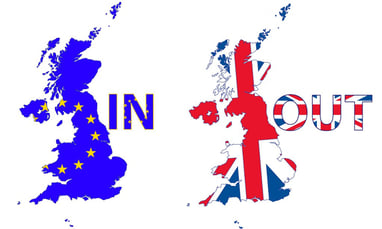Brexit, Burst Bubbles and the Housing Market
As the referendum on Brexit approaches, Arthur analyses the possible effects of the vote on the housing market and first-time buyers.
It’s referendum season in Britain and it is impossible to miss; everywhere you turn there are references to the In/Out vote on the 23rd of June. Following on from the previous blog entry about Brexit, we shall look at how the result of this vote will affect the housing market and, particularly, first-time buyers.
The current average price of a property in London is £600,476 (excluding the City) according to Land Registry data. Prices have increased by nearly 8% in the previous quarter; comparatively, outside London prices have dropped, on average, 1% quarter on quarter, now resting at around the £235,000 mark. The continuous increase in prices is making it harder and harder for young people to take that first step onto the property ladder. However, Brexit campaigners are arguing that all of this could change.
For those in the “Vote Leave” camp, exiting the EU will make no difference to the amount of foreign investment in London, it is too big to fail and will therefore always attract investors. Furthermore, with the possible decrease in regulation if Britain were to leave, foreign investment may even increase. With increased investment, there would be an increase in development, therefore more housing, some of which would be governmentally mandated “affordable housing” or “starter homes”, thus allowing more young people to buy property.
With the removal of the £55 million a day that Brexit campaigners claim Britain pays (they forget to include the rebate), the British Government would be able to invest in other projects, such as housing; this would again decrease prices as the Government could offer more in the way of financial aid towards would-be homeowners. This would be further aided by the possibility of a stronger Pound once its ties to the Euro had been removed.
A central argument for Brexiters is that immigration from Europe drives the pressure on demand in the housing market.. With an expected 200,000 migrants per year expected to enter Britain, alongside continuing population growth, there is significant pressure on the property market. By controlling immigration numbers, “Vote Leave” argues they will be able to relieve some of this pressure by increasing availability, thus decreasing prices. Furthermore, a decrease in immigration would, they claim, allow more British nationals to find work, thus decreasing the Welfare budget and creating a stronger economy.
This is the perfect result for team Brexit. Unsurprisingly, it has been vigorously argued against by “Vote Remain”. Their first point of order is that far from the economy improving, it would enter a deep recession, an assertion supported by both the Bank of England and the IMF, and thus the property bubble and housing market in general would collapse leading to house prices tumbling. For young people this may seem like a good thing, low prices allowing them to snap-up a bargain? Unfortunately not. With a weak economy, getting a mortgage would become even harder, especially for young people with a very short credit history. Furthermore, without a strong economy, investment, both governmental and private, would decrease. This would make it very difficult for the Government to try and hit its target of building 1,000,000 new homes by 2020, placing more pressure on the existing housing stock.
“Vote Remain” also argue against the assertion that a decrease in immigrants would help. As Housing Minister Brandon Lewis MP claims, Britain is around 75,000 builders short. A majority of those trying to fill this number are skilled migrants. By curtailing migration, house building will slow due to the fact that it takes 2-5 years to train, meaning supply will remain low. Consequently, prices and people’s willingness to sell will remain equally low.
Unfortunately for those of us that are voting, everything about leaving is speculative. There is no concrete evidence for either sides’ claims. Speculation is a dangerous game, however with less than a week to go, there is yet to be an independent report that claims Britain will be better off, or even the same, if “Vote Leave” win. With over 60% of under 30s stating they will vote to stay, it appears the younger generation would rather err on the side of caution.
Don’t forget to follow Arthur on social media for all the latest updates on the housing market!



